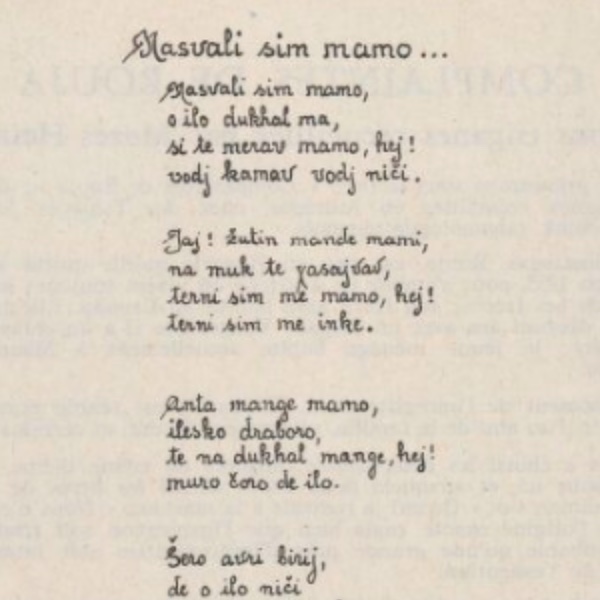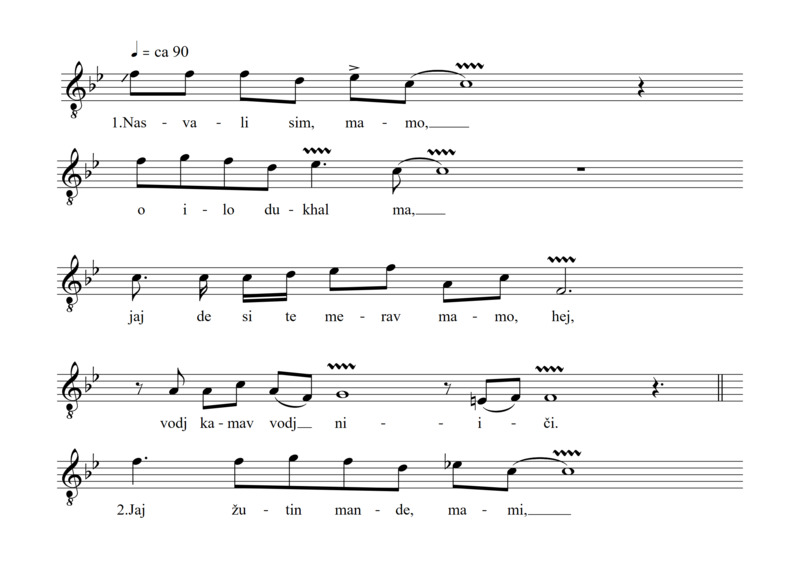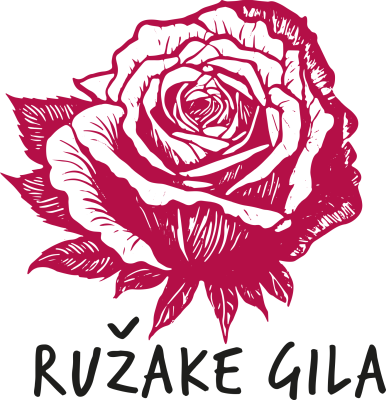
Nasvali sim, mamo
- Genre
- langsames Lied
- Thema
- Klagelied
- DOI
- doi.org/10.21939/k60b-7c39
Content
Recording
Nasvali sim, mamo is a lament addressed to the mother. The recording was made in 1965 by Mozes F. Heinschink.
Musical transcription based on Fern von uns im Traum...Te na dikhas sunende...Märchen, Erzählungen und Lieder der Lovara. Lovarenge paramiči, tertenetura taj gjila.
Nasvali sim, mamo is an old song that Ruža Nikolić-Lakatos has known since childhood. She rarely sang it in front of an audience and avoided singing it in front of her parents because of its heavy subject matter.
On the Phonogrammarchiv’s website, Christiane Fennesz-Juhasz presents a commentary by the singer on its content and meaning.
Commentary
(GERMAN ONLY) In an interview, Romani language expert Mozes F. Heinschink talks to ethnomusicologists Ursula Hemetek and Christiane Fennesz-Juhasz about Nasvali sim, mamo. He explains that Ruža never sang this song in front of her parents and that it contains typical Lovari phrases.
Lyrics
Stanza 1
| Nasvali sim, mamo, | I am sick, mother, |
| o ilo dukhal ma, | my heart hurts, |
| joj de si te merav, mamo, hej, | I have to die, mother, |
| vadj kamav vadj niči. | whether I want to or not. |
Stanza 2
| Jaj žutin man de, mami, | Oh, help me, mother, |
| na muk te xasajvav, | don’t let me perish, |
| terni sim me, mamo, hej, | I am young, mother, |
| terni sim me inke. | I am still so young. |
Stanza 3
| An-ta mange, mamo, | Bring me, mother, |
| ilesko draboro, | medicine for the heart, |
| te na dukhal mange, hej, | so that it doesn’t hurt me anymore, |
| muro čoro de ilo. | my poor heart. |
Stanza 4
| Šero avri birij, | The head can take it, |
| de o ilo niči | but not the heart. |
| Šero avri birij, hej, | The head can take it, |
| de o ilo niči. | but not the heart. |
Stanza 5
| Aj si te merav, Devlam, | I must die, my God, |
| vadj kanav vadj niči, | whether I want to or not. |
| si te mukav, Devlam, hej, | I must leave, my God, |
| e šukar ljumica. | this beautiful world. |
Stanza 6
| Xasajlem-tar, Devlam, | I have perished, my God, |
| či sama či lema, | I was not careful, |
| xalas ma de Devlam, hej, | they have perished me, my God, |
| e bare gindura. | these heavy thoughts. |
Stanza 7
| Soste, Marjom, soste, | Why, holy Mary, why, |
| soste barardan ma? | why did you raise me? |
| E bare gindonge, hej, | For the heavy thoughts, |
| a bara brigake? | the big sorrow? |
Stanza 8
| Aj soste, Devlam, soste, | And why, my God, why, |
| či žutis de pe ma, hej? | don’t you help me? |
| Te šaj kerav vi me | So that I too can once again |
| maj inke vi muri voja! | have a beautiful life! |
Stanza 9
| Gelas-tar i voja, | Past is the joy, |
| gelas-tar e šave, hej, | gone are the children, |
| aj ke si te merav, Devlam, | and I must die, my God, |
| egjedil, korkoro. | alone, all alone. |
Video
In honour of Mozes F. Heinschink's 70th birthday, Ruža Nikolić-Lakatos sings Nasvali sim, mamo for him. It is one of the jubilarian's favorite songs. The singer is accompanied by her son Mischa Nikolić on the guitar.
Further Material
In 1965, Mozes F. Heinschink published the song text with a French translation of Nasvali sim, mamo in Études Tsiganes.
Zitierempfehlung anzeigen
Bitte zitieren Sie diese Seite wie folgt:
Music and Minorities Research Center, "Nasvali sim, mamo", Ružake gila, zuletzt besucht am Loading date..., doi.org/10.21939/k60b-7c39


